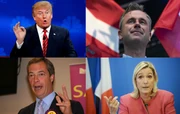
Far-right is the furthest-right section of the political spectrum, made up of supporters of social hierarchy, traditional values and a focus on national identity, supporting ideologies such as nationalism or political reaction, and is often opponent of modernism, liberalism, socialism, communism, anarchism, welfare, egalitarianism, and economic reform. Grounded in the belief that preserving cultural heritage and the concept of nation is paramount, the far-right advocates for strong national borders, a robust military, and may vary on economic stances, mostly supporting economic interventionism and nationalism or proctectionism, or even supporting a free-market economy, such as the case of the Pinochet's regime in Chile or the National Reorganization Process, in Argentina.
Far-right politics were first explored during the years after the First World War, when revolutionary nationalist movements such as Italian fascism or German National Socialism emerged in post-war Europe, some of them inspired by the Action Française. After World War II, led to the downfall of the Fascist regimes in Europe and Asia, the Cold War saw the revival of the far-right in opposition to communism. The United States and its allies decided to support the far-right in countries threatened by Soviet influence, and dictators in those countries massacred leftists and political opponents. The end of the Cold War in 1991 led to the far-right losing support from other countries, and many dictators would be overthrown. However, far-right politics grew as a result of Islamist terrorist attacks and the European refugee crisis, caused by the Syrian Civil War and the Iraqi Civil War, with some far-right politicians blaming jihadist attacks on Muslims. Although not exclusive from the far-right, politicians on this side of the spectrum are opposed to progressive ideas such as gay marriage, bridging the wage gap between men and women, and political correctness, often advocating a return to older ideas and a more conservative society.